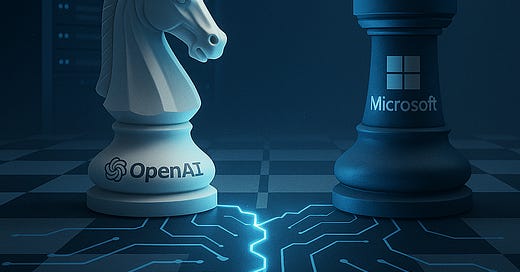Let’s talk about the most important relationship in tech right now - a $13 billion entanglement between the world’s most valuable enterprise software firm and the most hyped startup of the AI era. Microsoft and OpenAI.
It’s not a partnership. It’s Cold War diplomacy. Less collaboration, more a high-stakes standoff -between two companies with overlapping ambitions, asymmetric leverage, and diverging endgames.
Last week, OpenAI announced a restructuring. The plan: clean up the cap table, remove the investor profit caps, convert future earnings into good old-fashioned stock, and maybe one day go public. But there’s a catch: all roads to approval run through Satya Nadella’s office.
Here's the backstory
▪️ In 2019, Microsoft made the deal of the decade: $13B for a front-row seat to the future of intelligence
▪️They got 20% of OpenAI’s revenue through 2030. If OpenAI hits its forecast of $174B in revenue by then, that stake is worth $35B+
▪️Now OpenAI wants to cut that revenue share in half, to 10%, and convert Microsoft’s stake into traditional equity
Microsoft isn’t exactly celebrating. They want something else: long-term access to IP, especially the fancy stuff - like $20K/month agents that do PhD-level work. They also want continued use of OpenAI tech, which has sparked concerns internally at OpenAI about how that IP is used, where it goes, and who profits from it.
Both sides know they can’t quit each other - OpenAI still relies on Azure. Microsoft still needs OpenAI’s models. But they’re starting to build escape hatches.
🔗 OpenAI is cutting side deals with Oracle and Softbank for compute.
🔗 Microsoft is building its own models in-house, hiring founders of OpenAI rivals
And still, Microsoft remains the best-positioned AI company on earth.
🖥️ It hosts OpenAI - via Azure, the engine room behind ChatGPT.
🛍️ It sells OpenAI - through Copilot integrations across GitHub, Office, and Windows.
⚔️ It competes with OpenAI - via internal model development and acquisitions.
🧱 It underpins the ecosystem - most new codegen startups (Cursor, Windsurf) fork Microsoft’s VSCode and integrate with the GitHub stack.
💸 And it monetizes everything - because no matter where the models are trained, Azure still gets paid
In retrospect, the $13B deal Satya struck with OpenAI might be the most strategic investment in history. But as OpenAI grows more powerful, profitable, and public-facing, the terms of that deal are under pressure. Because when your most important partner becomes your most capable competitor - you’re not splitting the upside. You’re negotiating the endgame.




